
Dredger Staff

Soild 1-drop for aggressive decks with high minion density. The one issue is that it’s a terrible card to draw later in the game when you’re trying to close things out and your resources are dwindling, but most 1-drops work like that. This will do a job somewhere.
Score: 2
Classes: Hunter, Priest, Warrior
Sinstone Totem
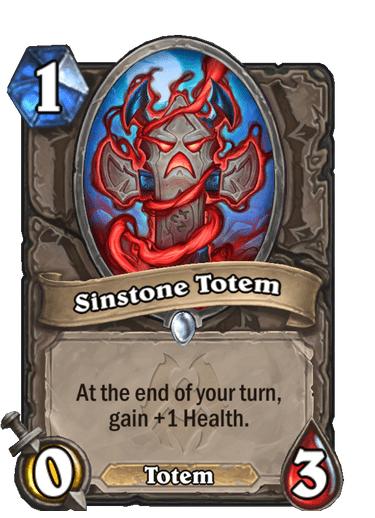
Interesting card for decks with buffs and a neutral totem. This is essentially a 1 mana 0/4 that can keep snowballing, so it’s hard to remove in the early game and becomes a threat once it gains an attack value. Suffers from the “first turn advantage problem”, as it will likely be dramatically worse on coin much like Peasant. Very weak draw later in the game. Can work for some decks that have enough early game buffs to take advantage of it consistently.
Score: 2
Classes: Hunter, Priest, Shaman, Warrior
Anonymous Informant

Strong early game mana cheating potential for secret decks. A neutral 2-drop that’s much better than a class-specific 3-drop in Kirin Tor Mage. The best part of Informant is that you can store the discount for later, so if you haven’t drawn a secret or want to wait until you play it in a following turn alongside a synergistic minion, you can. This is a big deal for the flexibility of your lines of play and your opponent’s ability to respond to those secrets. Big boost in the viability of these archetypes.
Score: 3
Classes: Mage, Rogue
Maze Guide

Not even strong enough for an Evolve deck. You want to use your Muck Pool charges on a bigger swing than this, and the later the game goes, the worst it gets. Seems to have a soft role in helping infuse cards in the early game, but we’re still not interested. Just too weak of a standalone card.
Score: 1
Priest of the Deceased

Well, if Druid is still up to play Razormane Battleguard, it can use this card as a generic taunt with some mid-game upside. The problem is that you’re not too likely to hold on to this card and wait until it infuses, so it will usually be a baseline 2/3 taunt. Druid likely has better things to do.
Score: 1
Roosting Gargoyle

Weirdly specific, and not a beast itself so… why is this a card you ask? We can buff our beasts without screwing up Pet Collector! This is next level.
Seriously, if you’re looking at this card when trying to build a Druid or a Hunter deck, you’re probably desperate.
Score: 1
Sketchy Stranger

This is going to be the best Quest Priest card in the opening hand. A 2-drop with a 75% chance of offering a Mage secret. In other words, a card that helps you consistently complete the most crucial phase of Seek Guidance. Auto-include.
Stranger is also a card that Rogue could be interested in. If we want to expand the secret package, it works well with Anonymous Informant, which you may want to run anyway. More importantly, it offers you a Paladin secret. A cheap secret can be quite helpful when we want to activate Gravedigger, or if we somehow decide to put Halkias in our deck. Could also be relevant for Thief Rogue with Contraband Stash. It’s a “free” 2/2 you can play on turn 2 without breaking your disguise and still discount Gnoll.
Score: 3
Classes: Priest, Rogue
Volatile Skeleton

There’s only class that could possibly be interested in hard running Skeleton, and that’s Mage. But even a Skeleton deck may not want to run it due to its low impact. We’ll be very generous here. Playing one Skeleton is worth another one when Kel’Thuzad comes down, after all.
Score: 2
Classes: Mage
Creepy Painting

Weird card, and probably bad. Nothing stops the opponent from just killing the painting first. Not too different from a 0/6 taunt in that sense.
Score: 1
Dinner Performer

Another weird, but interesting card. We could play a coveted 1-drop as our only minion and guarantee it being summoned on turn 4. Is this an Elwynn Boar card? Probably not in Priest, because it’s impossible to give up on Valishj and Cleric, but it would be funny if we had another Boar deck.
Score: 2
Classes: Boar decks, or weird decks, or weird Boar decks.
Forensic Duster

Cult Neophyte for minions, which is very interesting. Unlike Neophyte, this is a tool against fast decks that look to flood the board. It offers a stalling turn by disrupting your opponent’s development. Can be used later in the game, but probably more niche in application. Feels like a tech card, but it’s more likely to be used by slower decks looking to prolong the game.
Score: 3
Classes: Mage, Priest
Murlocula

Never underestimate a minion that can cost 0 mana. Murlocola is ideal in decks that look to flood the board and infuse it quickly, as the later the game goes, the less impactful a free body can be. Gives us Corridor Creeper vibes, but the condition is far more restrictive, as it is only discounted by your minions dying and it isn’t an incremental effect. It’s all or nothing. Note that this doesn’t work well in Evolve Shaman (an infused form is a transformed card costing 0 mana, which would evolve into a 1-drop).
Score: 3
Classes: Paladin, Shaman, Warlock
Scuttlebutt Ghoul

That’s a lot of butt. 10 health in taunt is a lot, but it does require you to control a secret which means you need a critical mass of them, and you also need a setup for it to be active on curve. Rogue and Mage are a bit stacked in the 4-mana slot so it could be hard to logically fit Ghoul in. Quest Hunter does play secrets but doesn’t want to spend mana on minions. Might not be a sure thing, despite looking impressive in theory.
Score: 2
Classes: Hunter, Mage, Rogue
Muck Plumber

Niche tech card, for something we’re not sure about since this is symmetric and affects your own minions as well. The problem with Plumber is that it’s too late to stop aggressive decks, so it might be meant to delay a minion-based combo or a big power play. Something like Kael’thas or Jace. Doesn’t seem great either way.
Score: 1
Sinrunner

We don’t even want to run this card in deathrattle decks, since the most important thing in these decks is the ability to cheat out threats rather than potentially respond to an opponent. A Deadly Shot isn’t a way to respond to an opponent very consistently.
Score: 1
Stoneborn Accuser

The idea is nice, as you can get off-board damage while playing a board-centric token deck, but it doesn’t fit with your game plan. It’s a very slow card for a deck that needs to swarm the board early.
Score: 1
Bog Beast

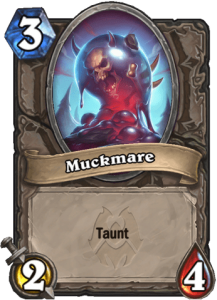
A new Sludge Belcher. This has respectable stats for a neutral 6-drop and 10 health in taunt, but we’re not in 2015. If you’re into deathrattle synergies, summoning a 2/4 isn’t in your plans, and decks like Quest Priest have much stronger turn 6 plays.
Score: 1
Masked Reveler

This is a card that can boost the consistency of your deathrattle synergies, at the cost of further limiting your deckbuilding. Stoneborn General is this card’s best partner, and it might help a non-Bomb Deathrattle Rogue deck hit stronger Smokescreens. Might also pop up in Druid with Hedge Maze.
Score: 2
Classes: Druid, Rogue
Red Herring

One of the coolest cards in the set-in terms of design and flavor. This is an intriguing card to play in combination with cheap giants, allowing you to set up Battlemaster turns, but it is very expensive. It’s not a bad standalone card though, with a massive 12 health in taunt allowing you to just drop it in some matchups to stall the game.
Interesting enough to give it a shot.
Score: 2
Classes: Giant decks
Stoneborn General
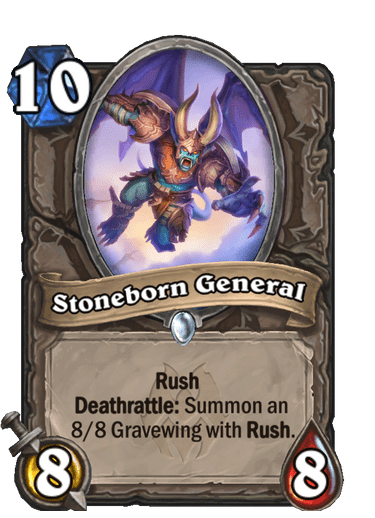
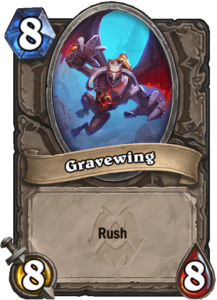
This is a minion you’re not meant to spend 10 mana to play, but it does have one of the strongest deathrattles in the format, which means it’s a prime target for deathrattle synergy packages. Whomper in Druid, Smokescreen in Rogue, as well as Reveler which we just discussed earlier, have great synergy with it. Reminds us of Scrapyard Colossus and we expect it to have similar impact.
Score: 2
Classes: Druid, Rogue, “Big” decks
Crooked Cook

This card is going to end up worse than it looks. The problem with Cook is that you’re very unlikely to draw a card on turn 2 after playing it, and it’s mostly good later in the game if you’re already ahead and punching your opponent in the face. We generally want cards that are good by themselves and certainly not ones that are only good in scenarios where we’re already winning.
If you’re playing a very, very low curve with full throttle aggression with buffs, this could be a consideration but for any deck slower than that, you’re likely going to pass.
Score: 2
Classes: Hunter, Priest
Invitation Courier

Probably not even a good enough card for Thief Priest, which says a lot.
Score: 1
Dispossessed Soul

A card that’s only useful after you placed one of the two copies of locations that are available in your deck and is otherwise a Chillwind Yeti.
Score: 1
Famished Fool

This might be a decent draw engine for a token deck, but this feels like the cope card of the expansion. Whenever you add this card to your deck, you’re probably in a desperate situation where you don’t have card draw and look for solutions that might seem alright in theory.
The problem with Fool is that it’s very slow. It’s also a cruel card to draw later in the game, when you’re running out of gas and this clown basically taunts you that he needs more time to juice up and be useful, but you don’t have any minions to place on the board.
Could be okay in swarm decks that don’t have better options, but that’s about it.
Score: 2
Classes: Mage, Paladin, Shaman
Steamcleaner

This is a significant tech card to introduce to the format. It answers Kazakusan, Prestor but also threatens things like Purified Shard. This is big news for attrition decks that have no way to answer these inevitable win-conditions that hard counter their game plan.
Score: 2
Classes: Reddit
Ashen Elemental

So, at its baseline, this is a 3 mana 2/4 that deals 2 damage to the opponent next turn and discourages them from drawing additional cards the next turn. Seems terrible and way too situational. New way to counter Ice Block in Wild though.
Score: 1
Demolition Renovator
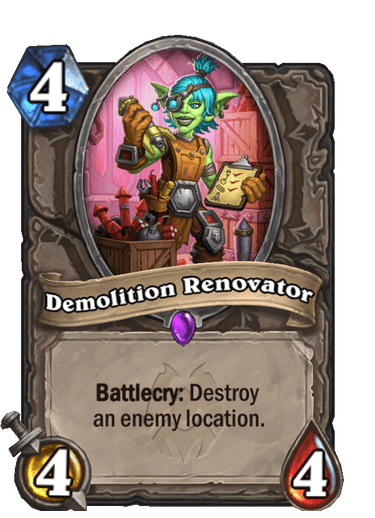
We’re guaranteed to tell you not to play this card in a future report.
Score: 1
Sinfueled Golem

Play big and slow things. Have them die. Then play very big and very slow thing. Sounds like a plan.
Score: 1
Party Crasher

Very funny card, but deceptively viable. A big deck carrying a lot of threats can use it to swing the board. Kill a thing, develop another thing. Only slight is that Party Crasher doesn’t have a static effect, so it’s not very valuable as a target to pull from the deck.
Score: 2
Classes: Druid, Big decks.
Insatiable Devourer

Another very expensive swing card. Its baseline form is usually bad, and certainly not something you want to regularly play. Its infused form is very strong and can potentially win games on the spot in some matchups. The only class that can both play this relatively early and infuse it reliably is Druid thanks to ramp, Flipper Friends, and Scale of Onyxia.
Score: 2
Classes: Druid
Murloc Holmes

One of the more interesting cards in the set, Murloc Holmes is a high-risk/high-reward value engine. The main issue with this card is that it’s not easy to guess all questions correctly on turn 3, as they may not have played the card in their opening hand, and you have very little deductive information on their hand and their deck. As the game goes late, these questions become easier to answer. So, a 3-drop that’s not very good on turn 3 but becomes a more reliable value engine later in the game.
Seems like mostly a fringe card for defensive, control decks. Even then, we’re not eager.
Score: 2
Classes: Paladin, Priest, Warrior
Prince Renathal

The early release card that has already changed the format to a significant degree. Not the card you ended up wanting in slow and defensive decks. More of a bandaid to decks with weak defensive tools, giving them a health cushion to reach their power spikes without getting rolled over. Alternatively, and sometimes in combination, decks that can reliably tutor their win condition or start with them in the opening hand (quests).
It should be interesting to see where Renathal ends up being successful in the future, though we don’t expect a dramatic change from what we’ve seen so far.
Score: 4
Classes: Druid, Hunter, Priest, Warlock
Theotar, the Mad Duke

We expect Theotar to be an extremely influential form of disruption. It is basically a cheaper and more reliable form of disruption than Mutanus, the only downside is that you give up a card to swap, but since this is a discover option, you’ll just be giving your opponent your weakest card. You can hit spells. You can hit locations. You can hit hero cards.
Theotar doesn’t make sense in every deck, but it could be an important tool to target key inevitability late game cards. It can also be useful in a faster matchup, though developing a 3/3 for 4 mana becomes a more significant price to pay here.
A big equalizer in some matchups.
Score: 4
Classes: Paladin, Priest, Shaman, Warlock, Warrior
Kael’thas Sunstrider

The new form of Kael’thas and might be just as scary as the previous one. Every class has access to Kael’thas/1-drop/10-drop on turn 7. Every class now has access to Kael’thas/Brann/Big Battlecry. Obviously, this isn’t something that we can expect to be ubiquitous, but players will look closely at the possibility that Kael’thas opens and are almost guaranteed to find a way to abuse it. Druid will probably be the class that does it first, as the synergy with Oracle of Elune and Wildheart Guff looks particularly delicious.
This new Kael’thas might be limited by board space, and you can’t chain it seemingly forever as the old Kael’thas, but we don’t really care. It will still do enough damage to become a meta defining card in the format at some point.
Score: 4
Classes: Demon Hunter, Druid, Mage, Shaman
Sire Denathrius

Denathrius might be the ultimate finishing card of the set and fits the expansion’s theme perfectly. With the potential for essentially infinite damage, decks could build around the possibility of endlessly infusing him until he kills the opponent.
But we don’t need to go that far. It’s enough for Denathrius to hit the 15-damage mark and he’s already a huge comeback card. The lifesteal is massive here, as he doesn’t just clean a potentially threatening board, but stabilizes our health total massively.
Tutors for Denathrius that allow him to be drawn early so that the infusing process can start: Capture Coldtooth Mine and Taelan Fordring.
Mana cheating effects: Kael’thas and Celestial Alignment. Both allow you to combo Denathrius with Brann. Denathrius’ damage can also be repeated and doubled up with Bolner and Macaw (since the card transforms as it upgrades).
Likelihood of making it into a top tier deck: High.
Score: 4
Classes: Druid, Shaman

Class: Reddit. 🤣
Love these, and appreciate the time you all put in. One small note – could you organize the final page by overall power ranking vs alphabetically?
I cant wait to play some fresh stuff
This read made me very excited for the new expansion. Many classes are getting new fresh and fun tools. Scared of druid though, but lets hope rafaam takes care of that.
Warlock stonks
Excellent write up! Was very entertaining and informative to read as well. Some really well balanced analysis here that makes me more excited for August 2nd, and scared. But excited.